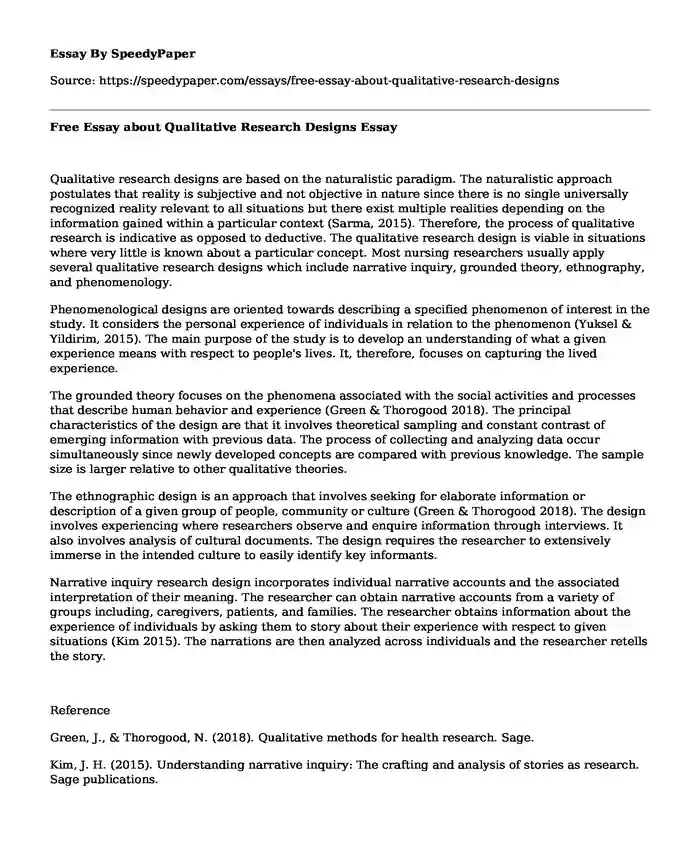Qualitative research designs are based on the naturalistic paradigm. The naturalistic approach postulates that reality is subjective and not objective in nature since there is no single universally recognized reality relevant to all situations but there exist multiple realities depending on the information gained within a particular context (Sarma, 2015). Therefore, the process of qualitative research is indicative as opposed to deductive. The qualitative research design is viable in situations where very little is known about a particular concept. Most nursing researchers usually apply several qualitative research designs which include narrative inquiry, grounded theory, ethnography, and phenomenology.
Phenomenological designs are oriented towards describing a specified phenomenon of interest in the study. It considers the personal experience of individuals in relation to the phenomenon (Yuksel & Yildirim, 2015). The main purpose of the study is to develop an understanding of what a given experience means with respect to people's lives. It, therefore, focuses on capturing the lived experience.
The grounded theory focuses on the phenomena associated with the social activities and processes that describe human behavior and experience (Green & Thorogood 2018). The principal characteristics of the design are that it involves theoretical sampling and constant contrast of emerging information with previous data. The process of collecting and analyzing data occur simultaneously since newly developed concepts are compared with previous knowledge. The sample size is larger relative to other qualitative theories.
The ethnographic design is an approach that involves seeking for elaborate information or description of a given group of people, community or culture (Green & Thorogood 2018). The design involves experiencing where researchers observe and enquire information through interviews. It also involves analysis of cultural documents. The design requires the researcher to extensively immerse in the intended culture to easily identify key informants.
Narrative inquiry research design incorporates individual narrative accounts and the associated interpretation of their meaning. The researcher can obtain narrative accounts from a variety of groups including, caregivers, patients, and families. The researcher obtains information about the experience of individuals by asking them to story about their experience with respect to given situations (Kim 2015). The narrations are then analyzed across individuals and the researcher retells the story.
Reference
Green, J., & Thorogood, N. (2018). Qualitative methods for health research. Sage.
Kim, J. H. (2015). Understanding narrative inquiry: The crafting and analysis of stories as research. Sage publications.
Sarma, S. K. (2015). Qualitative research: Examining the misconceptions. South Asian Journal of Management, 22(3), 176.
Yuksel, P., & Yildirim, S. (2015). Theoretical frameworks, methods, and procedures for conducting phenomenological studies in educational settings. Turkish online journal of qualitative inquiry, 6(1), 1-20.
Cite this page
Free Essay about Qualitative Research Designs. (2022, May 09). Retrieved from https://speedypaper.net/essays/free-essay-about-qualitative-research-designs
Request Removal
If you are the original author of this essay and no longer wish to have it published on the SpeedyPaper website, please click below to request its removal:
- Free Essay on Unionized and Union Free Environment for Employer
- UNICEF Essay Sample
- Free Essay with Tesco's Financial Performance Analysis
- Nursing Essay Sample: Disregard for Informed Consent, Responsibility and Accountability, Ethical Practice
- Essay Sample on Iconic Chairs Presentation: Thonet Chair No. 14 and Michael Thonet Michael
- Essay Example on Creating and Leading Effective Teams in Hospitals
- Essay Sample on Supervision of Human Resource
Popular categories





